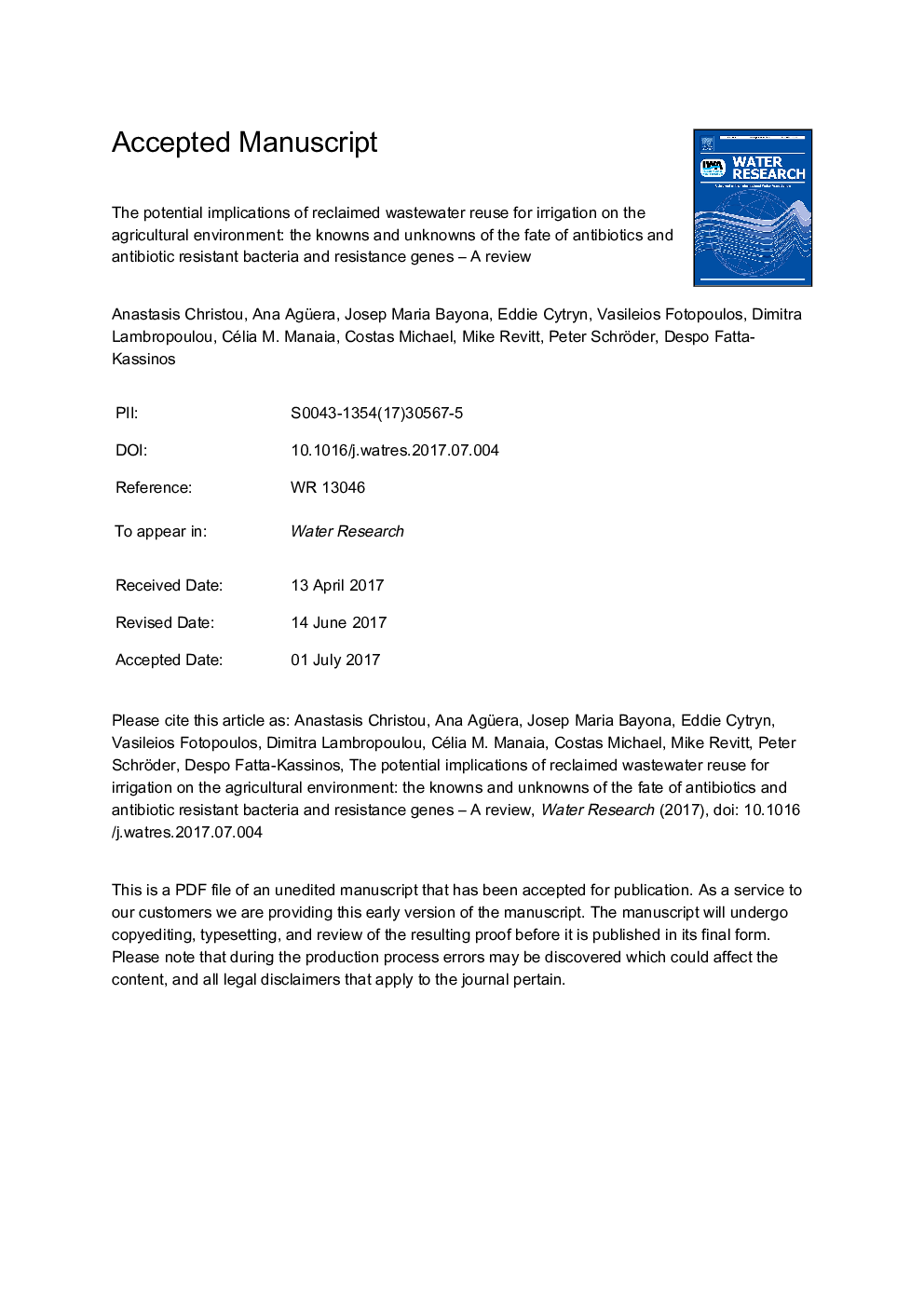| کد مقاله | کد نشریه | سال انتشار | مقاله انگلیسی | نسخه تمام متن |
|---|---|---|---|---|
| 5758830 | 1623045 | 2017 | 80 صفحه PDF | دانلود رایگان |
عنوان انگلیسی مقاله ISI
The potential implications of reclaimed wastewater reuse for irrigation on the agricultural environment: The knowns and unknowns of the fate of antibiotics and antibiotic resistant bacteria and resistance genes - A review
دانلود مقاله + سفارش ترجمه
دانلود مقاله ISI انگلیسی
رایگان برای ایرانیان
کلمات کلیدی
PLETPsARBMGEsGSTsTTCHGTDDAQqQAntibiotic-resistance genesAPCIKOCSolid liquid extractionSRMUltrasound-assisted solvent extractionESIUHPLCQuEChERSRWWARGs - ARG هاNER - DOWNH+-ATPase - H + -ATPaseROS - ROSSOM - WHOWWTPs - WWTPThreshold of toxicological concern - آستانه نگرانی سمیAntibiotics - آنتی بیوتیک هاPressurized Liquid Extraction - استخراج مایع تحت فشارmicrowave-assisted extraction - استخراج مایکروویو کمک می کندUse - استفاده کنیدAccumulation - انباشتHorizontal gene transfer - انتقال ژن افقیAntibiotic resistant bacteria - باکتری مقاوم به آنتی بیوتیکNon-extractable residues - بقایای غیر قابل استخراجMAE - بلهUptake - جذبHuman health risks - خطرات سلامتی انسانdow - دووquick, easy, cheap, effective, rugged and safe - سریع، آسان، ارزان، موثر، ناهموار و امن استcytochrome c oxidase - سیتوکروم سی اکسیدازMobile genetic elements - عناصر ژنتیکی تلفن همراهReclaimed wastewater - فاضلاب احیا شدهDOM - قضاوتSLE - لوپوس منتشر یا لوپوس اریتماتوس سیستمیکDissolved organic matter - ماده آلی حل شدهSoil organic matter - ماده آلی خاکTransformation products - محصولات ترانسفورماتورselected reaction monitoring - نظارت بر واکنش انتخاب شدهHILIC - هیلیکpolymerase chain reaction - واکنش زنجیره ای پلیمرازPCR - واکنش زنجیرهٔ پلیمرازProton pump - پمپ پروتونTriple quadrupole - چهارگوش سه گانهAntibiotic resistance genes - ژن های مقاوم به آنتی بیوتیکliquid chromatography - کروماتوگرافی مایعUltra-high performance liquid chromatography - کروماتوگرافی مایع با کارایی فوق العاده بالاhydrophilic interaction liquid chromatography - کروماتوگرافی مایع متقاطع هیدروفیلیdata-dependent acquisition - کسب اطلاعات وابسته به داده هاglutathione S-transferases - گلوتاتیون S-transferasesReactive oxygen species - گونههای فعال اکسیژنWastewater treatment plants - گیاهان تصفیه پسابelectrospray ionization - یونیزاسیون الکترو اسپریatmospheric pressure chemical ionization - یونیزاسیون شیمیایی جوی شیمیایی
موضوعات مرتبط
مهندسی و علوم پایه
علوم زمین و سیارات
فرآیندهای سطح زمین
پیش نمایش صفحه اول مقاله

چکیده انگلیسی
The use of reclaimed wastewater (RWW) for the irrigation of crops may result in the continuous exposure of the agricultural environment to antibiotics, antibiotic resistant bacteria (ARB) and antibiotic resistance genes (ARGs). In recent years, certain evidence indicate that antibiotics and resistance genes may become disseminated in agricultural soils as a result of the amendment with manure and biosolids and irrigation with RWW. Antibiotic residues and other contaminants may undergo sorption/desorption and transformation processes (both biotic and abiotic), and have the potential to affect the soil microbiota. Antibiotics found in the soil pore water (bioavailable fraction) as a result of RWW irrigation may be taken up by crop plants, bioaccumulate within plant tissues and subsequently enter the food webs; potentially resulting in detrimental public health implications. It can be also hypothesized that ARGs can spread among soil and plant-associated bacteria, a fact that may have serious human health implications. The majority of studies dealing with these environmental and social challenges related with the use of RWW for irrigation were conducted under laboratory or using, somehow, controlled conditions. This critical review discusses the state of the art on the fate of antibiotics, ARB and ARGs in agricultural environment where RWW is applied for irrigation. The implications associated with the uptake of antibiotics by plants (uptake mechanisms) and the potential risks to public health are highlighted. Additionally, knowledge gaps as well as challenges and opportunities are addressed, with the aim of boosting future research towards an enhanced understanding of the fate and implications of these contaminants of emerging concern in the agricultural environment. These are key issues in a world where the increasing water scarcity and the continuous appeal of circular economy demand answers for a long-term safe use of RWW for irrigation.
ناشر
Database: Elsevier - ScienceDirect (ساینس دایرکت)
Journal: Water Research - Volume 123, 15 October 2017, Pages 448-467
Journal: Water Research - Volume 123, 15 October 2017, Pages 448-467
نویسندگان
Anastasis Christou, Ana Agüera, Josep Maria Bayona, Eddie Cytryn, Vasileios Fotopoulos, Dimitra Lambropoulou, Célia M. Manaia, Costas Michael, Mike Revitt, Peter Schröder, Despo Fatta-Kassinos,